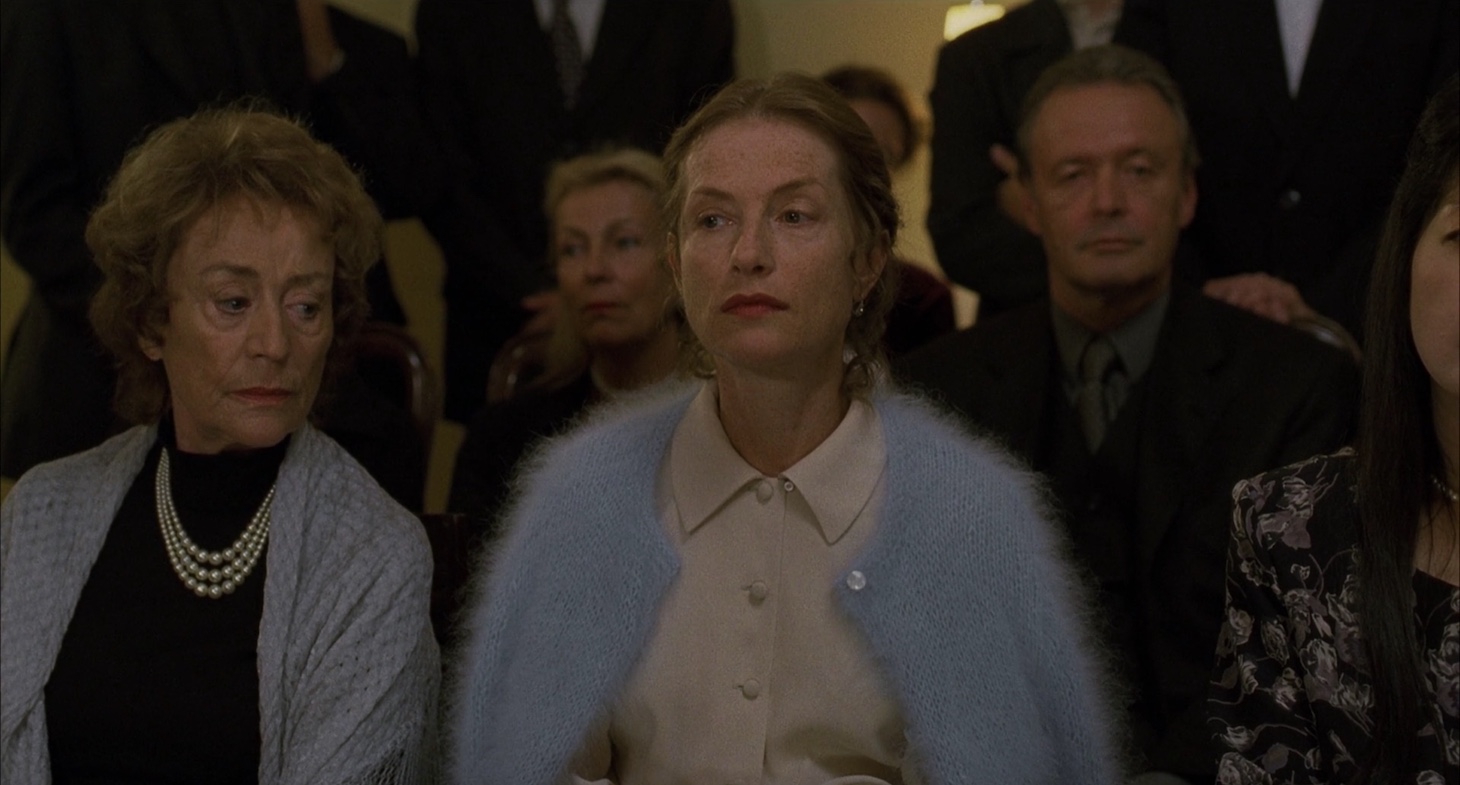Welcome to Cold Comforts, a recurring column in which Soraya Roberts writes about the grim, harrowing, and downright bizarre movies and television shows that she nevertheless can’t stop watching, over and over again.
It’s hard to understand how comforting The Piano Teacher can be unless you are incredibly uptight, like its main character Erika Kohut, and incredibly anxious, like the author of the roman à clef it is based on, Elfriede Jelinek. Thankfully, I have been blessed with both—incredible uptightness (it has relaxed significantly over the years—I think) and incredible anxiety (this one fluctuates)—so this film, well, it’s for me. Michael Haneke’s aptly brutalist adaptation centers on a not-quite middle-aged woman (Isabelle Huppert is slightly older than her character) who has, over the years, had the life systematically snuffed out of her by her mother. Overbearing is too tame a word for this woman. She is everywhere—calling in from outside a closed bathroom, checking in on the phone when her daughter is out, draping angora over Erika’s shoulders mid-conversation. The French word for suffocating, étouffant, is more onomatopoeic and it’s all I think of when I think of this woman, played to perfection by Annie Girardot. Once she’s done with Erika, all that’s left is a brittle carapace, a mask of perfection that might have been great—Erika is a piano teacher, as oppressive with her students as her mother is with her—had she not trained the spirit out of herself. So when her complete opposite shows up—a young pianist, Walter Klemmer (Benoît Magimel), whose zest for life almost overpowers his technique—and professes his love for her, you know it can only end in spectacular failure. This is not a film about love conquering all. No one here even knows what love is.
If you are a person who has experienced the life of the extremely anal, or the extremely neurotic, or both, you will know that having a circumscribed life quells your nerves. Erika’s life in The Piano Teacher is ideal in this respect. She barely goes anywhere. She leaves for her job at the conservatory in the morning, and comes back home at night. That’s it. If she happens to have a rehearsal or some other appointment, it is presented as a kind of invasion. Haneke is the perfect filmmaker to depict this rigidity, the kind of precise director who likes to pick the ideal frame and keep it static.
And if you’ve ever been to Vienna—both Jelinek and Haneke are Austrian—you'll know that there is nowhere more … particular. I remember visiting as a teenager and deigning to put my shoes on a subway chair ... and the entire car staring at me for the remainder of the ride. Everyone there seemed to have a straight back, all the streets seemed spotless. Erika’s asceticism fits in perfectly: no makeup, hair scraped back, oblate attire, Huppert’s own contracted stature further projecting her containment. Erika almost always appears in nearly empty functional spaces: her classroom with one picture on the wall, next to which she stands to have lunch (she won’t even allow herself the comfort of being seated); the rehearsal rooms furnished only with rows of chairs and a piano; the performance hall, unadorned, more chairs. And while her home is far from minimalist, it is entirely designed by her mother, an old-fashioned, outdated array of florals and velour and heavy drapery in which the old woman endlessly watches television. This is a flat which makes you miss the nothingness elsewhere.
There are a lot of glass doors in this film. There are a lot of doors, period. Doors upon doors. And the situation is always the same, Erika trapped within, always visible. The metaphor is obvious. What passes for the "meet-cute" involves a door like this, one of those old elevator cages that holds Erika and her mother as it ascends an apartment building, the two women having rudely shut the door in the face of the young man who has arrived right after them. With a bemused "Huh," he proceeds to chase them up the stairs, cocking his head towards them on each floor, twisting their discourtesy into a game of flirtation. And I don’t mean flirtation flippantly, I mean flirtation with an eye to conquering. Because that’s what this turns out to be. This guy, Walter Klemmer, is about to be Erika’s student, but only because she clearly doesn’t want him to be. If you’re a person like Erika, there is a perverse pleasure in denying a guy like this; a guy who has—and the cliché is apt here—everything. In The New Yorker, David Denby described Walter as “handsome as an Olympic skier,” and he does have an übermenschy quality to him: Besides his floppy-haired hotness, he’s also a precocious intellect and, despite being an engineering student, he also happens to dabble in piano, a dabble which is to everyone else a lifetime of sweat. This is a guy for whom everything comes naturally, from music to relationships. And he knows it, too. To Walter, there is no world in which he does not charm the pants off Erika.
But this is Haneke’s world, not Walter’s. “I have no feelings,” Erika says. “Get that into your head. And if I ever do, they won’t win out over my intelligence.” This is not the first thing she tells Walter, but it may as well be. She doesn’t even have to say it, it’s in her every movement. For a woman, this is eminently familiar. Women are so often reduced to their feelings that sometimes it feels (sorry) like the only way to resist this is to do the opposite—reduce yourself to your intelligence. I do this to myself. I try not to, but it’s often involuntary, a reaction to the surrounding limitations. It’s heartening to see another woman in this same struggle. The movie underscores all of this when Walter auditions for Erika's class. All of the presiding judges are blown away by his talent—except Erika, whose face Haneke zooms in on three times to show she is in fact as moved as they are. In response to their entreaties, she scoffs, saying she is not the person to “nurture his artistic temperament or virtuosity.” The message is clear: With a mother like hers, she could never be one herself. When Walter first plays the piano, for instance, despite being won over, all Erika does is look away. Erika is in fact nothing but feelings, the feelings just come out all wrong. Her compliments are insults. Her frustration erupts in laughter. She bites the heads off her words and yet overflows with tears as though she is filled only with them. She has complete emotional incontinence to the point that when Walter shows up for a lesson after professing his love, her eyes brim, she can’t stop coughing. Love literally chokes her.
Nice segue, because this is where we get to the S&M-adjacent stuff. The poster for The Piano Teacher has Erika and Walter embracing on the floor of a bathroom. Besides the John Waters vibes, this “erotic” signifier explains the film’s billing. I don’t actually find The Piano Teacher particularly sexy, and I am only dwelling on this aspect of it insofar as it speaks to Erika’s absolute inability to conceive of compromising, even at her most base—her “dearest wish,” we will find out, is to have her hands and feet tied behind her back while her mother is locked out of her room, out of her grasp. This is a woman who wants to entirely control her own submission, which, of course, is absurd. Haneke illustrates this absurdity at every turn. We see Erika sticking out like a sore thumb in the crowds of a shopping mall, brushing the bustle off her Burberry coat with her red leather gloves, ever the stickler for cleanliness, only to end up in a sex shop inhaling the discarded cum-filled Kleenexes of her predecessors. We see her in the cacophonous mess of a shared bathroom in her floral nightgown, cutting herself between her legs, her mother’s call to dinner providing the soundtrack for the blood dripping down the bathtub. We see her kneeling down next to a car where two people are having sex during a drive-in movie (Frequency), pissing through the pain.
So where does the Olympic skier fit into all of this? He can’t. A relationship requires compromise—even more so for a woman—and neither of them are willing (Erika even less so). He because he gets everything he wants, she because she doesn’t. Their first encounter comes after Erika sees Walter sweetly disarming a girl out of her performance anxiety. But as Erika’s mother has told her, “No one must outdo you, my girl.” In response, Erika disappears into the cloakroom, crushes a glass and empties it into the girl’s pocket. Amid the girl’s screams, Erika hightails it to the bathroom to relieve herself, where through her wound she can feel the pain and pleasure all at once. Walter sees all of this and (a little weirdly, admittedly) considers it Erika’s love confession. What follows is a sex scene of epic frustration in which Erika starts and stops a hand job over and over and over again, all the more to humiliate this cleft-chinned wunderkind and keep the power literally in her hands. “I love you,” he says. “Why are you hurting me?” Oh, dude. His confusion would be touching if he weren’t so hellbent on conquering this woman whose mother got there first a long time ago. All that is left for Walter is a hand-written letter several pages long of Erika’s desires—everything from binding and beating to suffocation—painfully exposed in tight blue script. “What will all this get me?” he asks, admitting what we already knew, that love for him is as self-serving as it is for her.
“Have you read Adorno on Schumann’s Fantasie in C Major?” Erika asks Walter when they first meet. “He speaks of Schumann’s twilight. It’s not the Schumann bereft of reason, just before that. A fraction before. He knows he’s losing his mind. It torments him, but he clings on one last time. It’s the moment of knowing what it means to lose oneself before being completely abandoned.” The remainder of The Piano Teacher sees the chasm between Erika and Walter grow wider and wider the closer they get. The culmination is a scene which at first to me was not clearly a rape—Walter is narrating Erika’s letter as he acts it out—but in retrospect is most certainly that because the whole basis of Erika’s fantasy is that she is in control of her own degradation, not Walter. In this case, Walter is the only one who gets off. And yet, who is the victor in the end? In truth, Erika never can be because you can’t be the victor and the vanquished all at once. But is the victor this young man who further traumatizes this traumatized woman, then sees her the next day with the beaten face that he gave her (“You can’t get a guy going and then escape …”) and passes her by like it was nothing? Is the victor the man who will live through his own life not truly knowing what he has done? Or is the victor the woman who blinks back tears, who even after he has gone, when she is all alone in that huge performance hall, valiantly tries to control her emotions one last time—who clings on one last time? Is the victor the woman who pulls a knife from her purse, makes a grimace the likes of which we never thought her capable, and stabs herself in the heart? In this final act it is she who is in full control of her own penetration, it is she alone—for once, no mother in sight, no lover—who finally walks through those glass doors into the cool air of the evening. It is she who is free.






